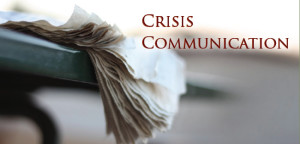College sports has taken a hit over the past several weeks. While scandals in college athletics is nothing new, the number of PR black eyes that it suffered in just over a week’s time has it reeling. First there was Ed Rush, forced to resign as Pac-12 coordinator of officials following comments that seem to imply that he was putting a bounty out for Arizona coach Sean Miller. Then Rutgers fired its basketball coach, Mike Rice (for hitting, kicking and throwing basketballs at Rutgers’ students and shouting homophobic and misogynistic slurs at players). Then Rutgers’ athletic director, Tim Pernetti was forced to resign over his handling of the Rice affair, and many want the university’s president to follow. And finally Auburn University faces a major scandal following blockbuster allegations of paying players, racism, and changing grades to keep players eligible. Not the public relations image the universities or college athletics want. Let’s not forget this comes on the heels of the Penn State/Jerry Sandusky scandal that forever tarnished an iconic college program and coach. It’s time for crisis communication.
Scandals and college sports are nothing new. Yet several happening all in one week is new and while the public has grown accustomed to scandal and wrongdoing, this much may be the tipping point for the image of college sports. The old wholesome image of college players such as Jackie Robinson, Joe Namath, and coaches like Bobby Bowden and Knute Rockne have long faded. College athletics is a big and full time business. Yet despite this, fans expect it to be clean. The scandals that have emerges show that it is anything but clean. How should the universities and college sports respond, so they can begin restoring their image?
First admit that there is a problem. Auburn is disputing the ESPN reports and trying to act as if there is no substance to any of the reports. Rutgers has been ham-handed in their dealing of the scandal and may yet see the university’s president resign. That is the wrong approach. Even if in the case of Auburn, the problem isn’t as widespread as reported, the university needs to be proactive and ahead of the story. Accept that some things were done wrong and they will be corrected. Nobody believes that nothing happened. If any part of ESPN’s story, that new head coach Gus Malzahn, (who during the time of the incidents was the offensive coordinator) was involved, he needs to be terminated. In the case of Rutgers, the president has to come clean with what he knew and when he knew it. If his response doesn’t pass the smell test, he needs to resign or if he refuses, terminated by the board of governors. The NCAA also needs to admit that there is a college sports problem and while these cases are not the norm, they have become far too common lately and that they are taking corrective steps to address the scandals that keep emerging in college athletics. Zero tolerance for such behavior and individuals should be the universal theme.
Next comes the corrective steps. In the case of Rutgers, the replacements for Rice and Pernetti must be individuals above reproach. The new head coach should be a person who can provide discipline in a stern, yet loving manner that can shape the players’ characters. The new athletic director should be someone who can provide direction for all of the athletics and provide clear and concise leadership. The school should also voluntarily take themselves out of Bowl invites and other incentives for the program for one year. This will send a strong signal to people that Rutgers has zero tolerance for the behavior that occurred. Likewise Auburn should do the same. The NCAA should announce the formation of a committee outside of college athletics to investigate itself, make recommendations for corrective steps, and implement them. Whatever the financial losses to the NCAA and universities, both must be willing to shoulder them and demonstrate that they are not sweeping things under the rug and are making fundamental changes so that such a culture does not continue.
Implement a comprehensive program. Universities and the NCAA should highlight the positive aspects of college athletics which are many. Rather than putting the emphasis just on winning and who the best players and coaches are, what needs to be shown is the work that many college athletes do in the community with non-profits and how they mentor many young children who seek to play college athletics one day. These things happen all the time and go unreported. The NCAA and universities need to begin putting the emphasis on this rather than just the wins and losses.
Fans will continue to root for their favorite teams and watch games but with each scandal that emerges the ties that bind fans with college athletics weaken and weaken donations. That is why after a week of scandal, college sports must look itself in the mirror and clean up its image. If it doesn’t, it does so at its own peril.





